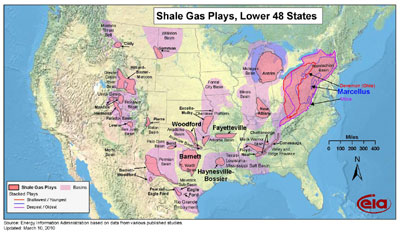Earlier this year, both Houses in Maryland passed legislation that bans fracking, but we’ve been waiting to see if the governor would veto it.
It turns out that Maryland’s new Republican governor, Larry Hogan, decided not to veto it or even sign it, which allows the two year moratorium to enter force without his blessing.
The bill passed with veto-proof majorities in both Houses, so there wasn’t much point in vetoing it. It passed 102-34 in the House of Delegates and 45-2 in the State Senate.
"Passing a moratorium under a pro-fracking Governor is a testament to the effectiveness that organizing can have. When we are used to seeing moneyed interests rule, it is encouraging to see elected officials heed the will of the people to protect their communities," comments Mitch Jones, Common Resources Director at Food & Water Watch.
100 groups came together under the Don’t Frack Maryland Campaign and health professionals, business owners, farmers and families all spoke out.
Even though there’s plenty of evidence, the law requires an extensive study of fracking’s impact on the environment, public health and the local economy.
"Now we have two years to continue to compile indisputable scientific data," says state Senator Karen Montgomery, who co-sponsored the bill.
There are over 425 peer-reviewed scientific studies on fracking impacts, most published since 2013, and of the 49 studies that focus on health in particular, 96% found it to problematic, according to Food & Water Watch.
Maryland is one of the states chosen to export fracked natural gas, however.
Meanwhile, North Carolina just gave its first fracking permit and NAACP, the group behind Moral Mondays, is investigating. One fracking site is in a majority-black community in a county that is otherwise 90% white. Incredibly, the site is under a coal ash pond.
New York Releases 2000-Page Fracking Study
After permanently banning fracking in December 2014, NY’s Department of Environmental Conservation (DEC) released a final report that details why the decision was made.
While Maryland has only two counties (in the western part of the state) that sit on the Marcellus shale, NY State is gas-rich, which makes the ban even more impressive. But the legislature didn’t pass the ban – Governor Cuomo did through executive order – which means it can be reversed by a future governor.

DEC received over 260,000 public comments – an unprecedented number – the report says. Basically it says that DEC tried to develop regulations that would protect the public and environment from fracking but found there was no way to do it well without banning it.
The report details the long list of potential problems associated with fracking. There are chapters on:
- air impacts that can affect respiratory health from higher levels of particulate matter, diesel exhaust and volatile organic chemicals;
- drinking water impacts from underground migration of methane and/or fracking chemicals from poor well construction or seismic activity
- surface spills that pollute the soil, groundwater, and surface waters
- water contamination from inadequate wastewater treatment
- earthquakes and creation of fissures from fracking
- community character impacts such as increased vehicle traffic, road damage, noise, odor complaints, and greater need for housing and medical care
- climate change impacts from methane and other volatile organic chemical emissions
DEC considered expanding many mitigation measures to prevent these potential problems, but that put more and more areas off limits, they say. "For example, the Department considered prohibiting high-volume hydraulic fracturing on private lands within Catskill Park, increasing setbacks to residences, and natural and cultural resources, and expanding the sensitive areas that would be off limits. These restrictions and the necessity for close and coordinated regulatory oversight by the Department and other state and local agencies would substantially increase costs to industry, which would likely negatively impact the potential economic benefits associated with high-volume hydraulic fracturing."
Another reason is, "In the long term, New York’s policies are directed towards achieving substantial reductions in greenhouse gas emissions by reducing reliance on all fossil fuels, including natural gas."
While replacing coal with natural gas may reduce emissions in the short term, it may suppress investments in energy efficiency and renewable energy, making them less competitive with fossil fuels, and prevent NY from reaching its climate goals.
Here is the report:
